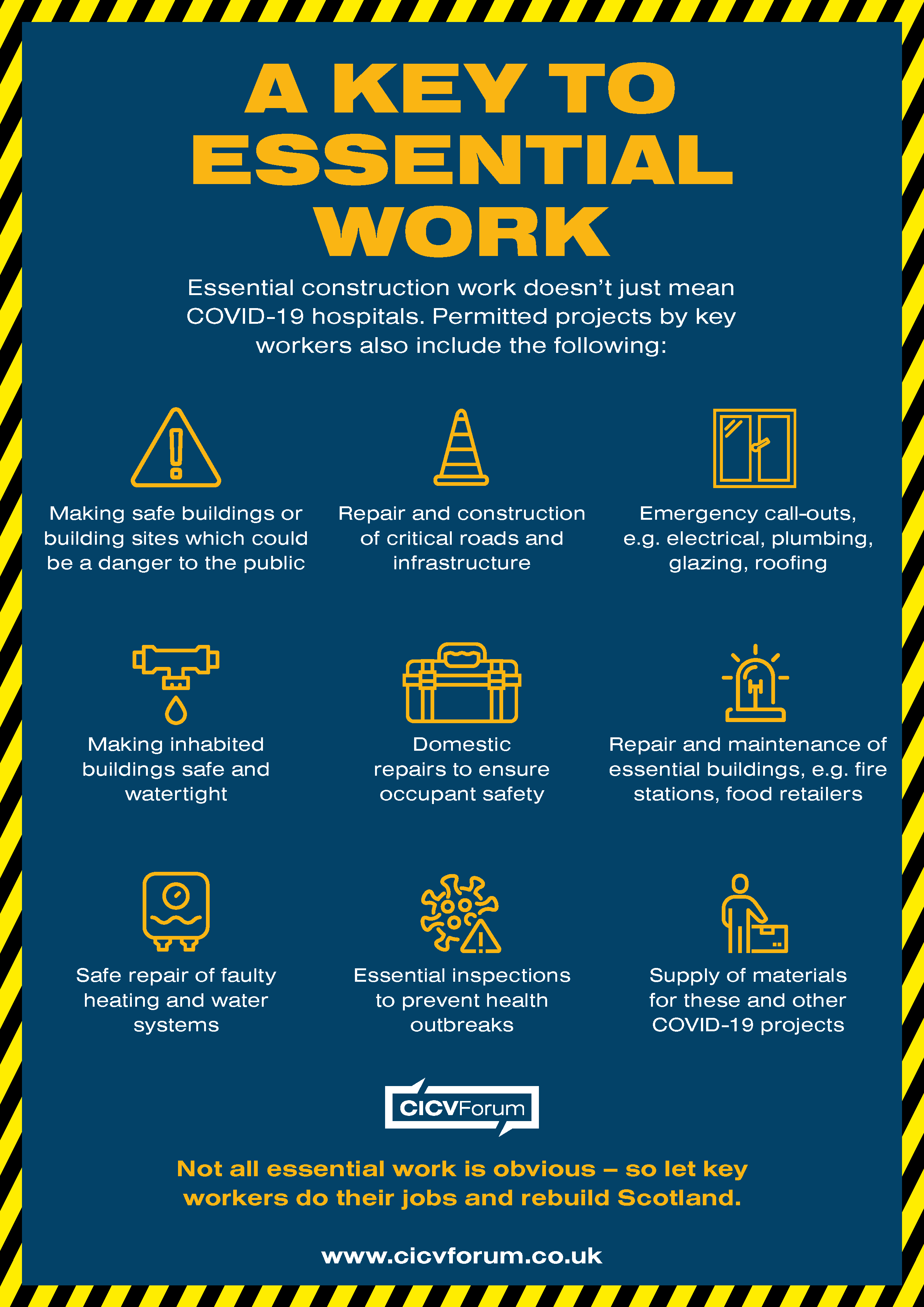In general the advice from the First Minister, Nicola Sturgeon, mirrors that of the UK Government. Although there are some notable exceptions which we highlight here.
 Open Letter to Scotland’s Construction Sector
Open Letter to Scotland’s Construction Sector
25 February: Minister for Local Government, Housing and Planning, Kevin Stewart MSP, has published an open letter to everyone working in Scotland’s construction sector. It advises on the impact of the vaccination programme but the need for continued Covid-safe practice on construction sites.
New Devolved Nations Lockdowns
6 January: Scotland has entered a new national lockdown until at least 31st January. Scottish Government lockdown guidance states that you must work from home if you can. Construction and essential work in people’s home can continue.
Scottish construction sector moving towards Phase 2
11 June: The Scottish First Minister, Nicola Sturgeon, has announced today that the Scottish construction sector will be able to move to Phase 2 in its Restart Plan.
- Phase 0: Planning
- Phase 1: Covid-19 Pre-start Site prep
- Phase 2: ‘Soft start’ to site works (only where physical distancing can be maintained)
- Phase 3: Steady state operation (only where physical distancing can be maintained)
- Phase 4: Steady state operation (where physical distancing can be maintained and/or with PPE use)
- Phase 5: Increasing density/productivity with experience
Moving to Phase 2 of the plan provides an opportunity for businesses to return to site work on a “soft-start” basis. It also allows businesses to undertake all forms of work in domestic properties.
To provide further assistance to those who will work on sites, Construction Scotland has issued a guide entitled Working on site during the COVID-19 pandemic: Construction Guidance.
The CICV Forum (which NFRC Scotland is an active member of) has developed more detailed guidance on returning to site safely
Scottish Government Publish Construction Policy Notes (CPN)
The Scottish Government have produced several Construction Policy Notes (CPN) in relation to Covid-19 which can be found below:
Safe return and restart
The new CICV document is available: Safe return and restart—Expanded Guidelines to Underpin Construction Scotland’s Safe Operating Guidance. A special note of thanks to Craig Hartley of HLS McConnell Ltd who represented the NFRC on the CICV Health and Safety Subgroup which produced this guidance.
CICV held a Health and Safety webinar which was recorded and can be viewed online.
After working with representative bodies, employers and trade unions from the construction sector, updated guidance has been published to help construction restart safely and recover from the damaging impact of COVID-19.
Please find links to the key documents below:
CICV Forum Webinar: 3rd June
In this CICV Webinar we will look at payment and cashflow issues, before and after COVID-19. We will discuss the contractual and financial implications of site suspensions and start-ups, how construction businesses should protect their commercial positions more efficiently, and we will look at fast track methods of dispute resolution. Please feel free to submit any questions in advance.

You will all be aware that the First Minister has announced that restrictions over some of our personal and work activities will begin to ease from tomorrow and into next week. One of the specific industry’s she mentioned in beginning to return to work was the construction industry.
She confirmed that the construction sector will be allowed to implement the first two phases (as below, phases 0 and 1) of its restart plan with a decision to move to ‘phase 2’ of the plan after consulting with government to ensure it is safe to do so in line with public health advice.
The industry-agreed six-step phased model for the return of the construction sector is as follows:
- Phase 0: Planning
- Phase 1: Covid-19 Pre-start Site prep
- Phase 2: ‘Soft start’ to site works (only where physical distancing can be maintained)
- Phase 3: Steady state operation (only where physical distancing can be maintained)
- Phase 4: Steady state operation (where physical distancing can be maintained and/or with PPE use)
- Phase 5: Increasing density/productivity with experience
See the Working on site during the COVID-19 pandemic—Construction Guidance prepared by Construction Scotland.
If you were unable to watch this webinar at the time it can now be viewed online.
Construction to restart in Scotland
28 May: The Scottish First Minister, Nicola Sturgeon has announced that “from tomorrow, the construction sector will be able to restart site preparation, that’s the first phase of its restart plan. It will be required to consult further with government before moving on to the second stage of that plan”. Alongside this the Scottish Government guidance for construction sites has been updated.
PREPARATION FOR CONSTRUCTION WORK TO RESTART IN SCOTLAND FROM 28 MAY 2020
22 May: The Scottish First Minister, Nicola Sturgeon, has confirmed that the advance preparation of non-essential construction sites in Scotland can begin from 28 May 2020. The Scottish government have also published its route map out of the crisis and will be publishing sector-specific guidance, including for construction next week.
Should construction sites stay open?
Scottish Government guidance on construction sites and associated works that can continue under specific conditions
The Scottish Government has produced prescriptive guidance for the construction sector. The construction sector and its supply chain is considered a non-essential business sector, except where supporting an essential sector. The essential sectors are listed as:-
- Energy
- Communications—Telecommunications, Public Broadcast, Postal Services, Internet;
- Government
- Transport
- Finance
- Civil nuclear
- Defence
- Chemicals
- Space
- Health
- Food
- Water and waste
- Emergency services
Example of what constitutes essential work for these sectors are detailed in its guidance.
This guidance came into effect on the 6th April 2020 and extends until further notice.
Animation helps contractors and customers stay safe
A new animation launched by the Construction Industry Coronavirus (CICV) Forum offers clear and practical advice to contractors and customers during emergency domestic work.
The short film outlines the precautions and operate-at-distance policies that the Forum has issued as guidance to protect everyone against COVID-19.
Entitled In This Together, the animation provides parameters during essential emergencies following recent Scottish Government instruction for all non-essential work to cease.
Anne Vessey, Head of Marketing and Communications at the Electrical Distributors’ Association (EDA) and Head of the CICV Forum Communications Sub-Group, said that the new film was open source and was designed to be shared by as many people as possible.
She said: “It has become very clear that we will only beat this devastating virus by co-operating, and the different members of the Forum have come together in a remarkable way to support a sector which itself supports so many different trades and skills.
“This concise animation clearly explains how we can all reduce risk of Coronavirus exposure when necessary emergency work or repairs have to be carried out in the confined spaces of the domestic environment.”
The animation advises that contractors:
- Use the CICV Forum template to communicate and plan work
- Check that no one in the work site has symptoms, and assure that contractors have no symptoms
- Stand 2 m apart and don’t shake hands
- Wash hands during and after work, using their own towel
- Wipe down all tools and instruments.
Ms Vessey said the film also emphasised how homeowners can also play their part by:
- Opening doors and windows and staying in a separate room
- Signing work off electronically
- Using bank transfers, not cash, for payments.
CICV Forum Key Worker
The CICV Forum (Construction Industry Coronavirus Forum) have issued a new infographic that aims to provide greater clarity over essential work and help the public understand exactly what construction projects key workers can carry out.

The infographic was developed by the Forum after key workers reported being harassed and verbally abused during vital construction projects.
Forum members reported an increasing number of tradespeople being intimidated and verbally abused by the public while carrying out legitimate projects in line with CICV Forum guidelines.
The graphic has therefore been developed to show a checklist of projects that will help the public understand the range of work classified as ‘essential’ by key workers.
John McKinney, secretary of Forum members NFRC, the Stone Federation and the Scottish Contractors Group, who said: “Essential construction work is not confined to building a major hospital for COVID-19, but we know that people might not be aware of this.
“Greater understanding is needed among the public to understand that the key workers carrying out such work aren’t flouting the rules—they are performing essential tasks and should be allowed to do so without fear of abuse.”
You can download a printable version of the Key Worker infographic.
Children still attending school
In Scotland, it is left up to the different local authorities to decide who are classed as essential workers and therefore their children can still go to school. Whereas the UK Government has instead published a list of essential workers.
Guidance issued by the Scottish Construction COVID-19 Forum
The Scottish Construction COVID-19 Forum which includes representatives from: BCSA, BESA, BMF, CECA (Scotland), EDA, FMB, LEIA, NFRC, RIAS, RICS, SBF, The Scaffolding Association, The Scottish Construction Group, SELECT, SNIPEF and the Stone Federation (GB), was set up with the aim of bringing together the main construction trade and professional bodies to allow us to gather intelligence, share advice and speak directly with the Scottish government on issues affecting members in the current crisis.
They have issued a number of documents regarding the crisis: